Staff Book Reviews by Genre: Other Fiction
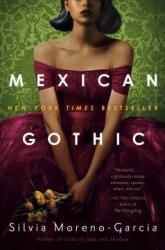
Noemí Taboada is a beautiful socialite who loves wearing opulent purple gowns, riding in a convertible and smoking French cigarettes. A woman of her station, as the novel relates, "was expected to devote her time to the twin pursuits of leisure and husband hunting." Instead, this strong-willed, intelligent and brave woman seizes an opportunity not realizing it could lead to her demise. Neomi’s father receives a disturbing letter from his niece and recent newlywed Catalina. The frenetic message suggests a mysterious doom awaits Catalina, who may need psychiatric help and a divorce, a scandal the businessman wants to avoid in 1950s Mexico City. So Neomi negotiates her way into a chance to attend graduate school – rare in a country when women could not vote – in exchange for heading to the isolated High Place, a distant Victorian mansion once funded by now-depleted silver mines. Once there, she must find out if the letter is nothing more than “female hysteria” as Neomi’s father assumes, or something more sinister.
Moreno-Garcia does a wonderful job sprinkling in the antiquated language of classic Gothic horror to pace this atmospheric creeper while Neomi’s dread about the Doyle family and its hideous patriarch mounts, as does her dueling desires to stay and garner graduate school or flee for her own sanity. The oppressive feel of dead, rotting High Place hints at a history of violence, madness and even darker secrets as the 320-page novel’s protagonist soon finds out. Once there, she meets the drugged Catalina’s menacing and alluring husband, who worms her way into her dreams, which are becoming an evermore disturbing mix of lust and horror. Her only ally is the family’s youngest son, who seems a decent fellow, but hides secrets of his own. Follow along as the amateur sleuth learns more about High Place, its exploitive colonial past and its unique power as the novel – equal parts Daphne du Maurier, Stephen King and H.P. Lovecraft –speeds toward a satisfying, albeit gory conclusion.
Awards: 2020 Goodreads Choice Awards Best Horror
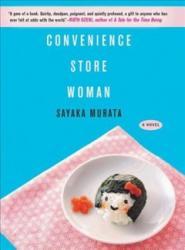
This poignant English-language debut of one of Japan best contemporary writers is the best-selling story of 36-year-old Keiko Furukura, a quirky outsider who struggled to fit in until she found peace and purpose in her life working at Smile Mart. Human interaction and social norms are difficult for her to comprehend but the store manual explains, line by line, how to act. She does her best to copy her fellow employees' mannerisms and dress to better play the part of a "normal" person and remain a "useful tool" for the store. But after 18 years at the same store, her family and coworkers pressure her to make one of two choices -- focus on a career or marry and start a family. These constraints force the self-described "convenience store animal" whose emotions are only stirred by "the store's voice telling me what it wanted, how it wanted to be" to take measures to avoid scrutiny. This deadpan love story about a quirky woman and a store sticks with you long after you've finished thanks to some beautiful writing, a memorable protagonist and the larger questions raised. The short novel (163 pages) touched a nerve in Japan, generating a sustained discussion concerning conformity, especially for women. The book's notoriety garnered Murata, who continues to work at a convenience store after 18 years, Japan Vogue Magazine's 2016 Woman of the Year honor.
Awards: Akutagawa Prize

Rikio is a star and he likes the glamor, money and notoriety that comes with that lifestyle. His ears ring with the cheers, screams and exhortations of fans, mostly young women, who would kill for a moment with him. But it also means constant scrutiny, which has the 23-year-old celebrity struggling with his own anxieties and obsessions. What if those fans stop desiring him someday? The self-loathing star would rather be in character on a movie set than be himself.
Written shortly after starring in his first film, the late Yukio Mishima delivers a blunt, rich portrayal of a flawed young man lost between his public persona and private life. The novella, first published in 1961 and translated into English for the first time in 2019, is even more relevant now in today's 24/7 media landscape. Awards: Japan-U.S. Friendship Commission Prize for the Translation of Japanese Literature
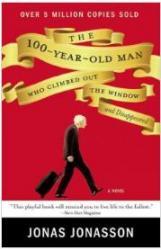
This charmer was a runaway international bestseller and it is easy to see why. The main character, Allan Karlsson, is memorable even as his stories from his wanderings around the world get more and more far-fetched. Karlsson has always done what he wanted and skipping his 100th birthday party at the start is the least surprising thing when looking back upon this Swedish novel. I read this for a book group (book club set available through PPLD) and one participant described Karlsson as Forest Gump with a dangerous affinity for vodka and explosives. This "intelligent, very stupid novel" as the author described it, is enjoyable if a tad long.

This beautiful exploration of living in the moment centers on the relationship between a brilliant math professor, his young housekeeper and her 10-year-old son. The professor suffered a traumatic brain injury decades earlier, limiting his
short-term memory to only 80 minutes. She is hired to care for this unique, challenging client. And every morning, the housekeeper and the professor meet anew, creating this strange, yet lovely relationship that blossoms between them. The damaged yet lively mind of the professor allows him discover connections in everyday items like shoe sizes and the universe at large, an eye-opening experience for mother and child as their lives draw closer together. The short novel focuses on those mathematical equations and the emotional connections that create a unique family. The 2009 English translation is available as a PPLD book club set. The novel's bibliography cites The Man Who Loved Only Numbers, a biography of Paul Erdos, on which the professor character is based. The 2003 novel, original title The Professor's Beloved Equation, won the Hon'ya Taisho award. It was a massive bestseller in the prolific, well-regarded Ogawa's native country.
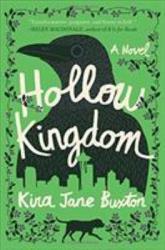
This debut novel is a refreshing romp through the Apocalypse narrated by a foul-mouthed domesticated crow whose only knowledge of the world is TV. This mash-up of "The Incredible Journey" and "The Walking Dead" has an environmental message, focusing on humankind's increasing disconnect from the natural world. You may want to reconsider all those hours of screen time. But do read this novel, which while a tad long, chronicles the adventures of S.T. (not a library appropriate name) and his heroic steed, the dim-witted dog Dennis. The crow tries to save humankind, learns about himself and the natural world in a frightening new Seattle featuring an emerging predator.
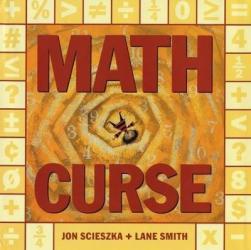
Some days you might feel that you are under a math curse where everything has become a math problem. This is the story of a girl whose life is just like that. Everything – even things that shouldn’t be math – now involve math! Work along with her to solve the problems and therefore, solve the math curse. Read and see if she succeeds.
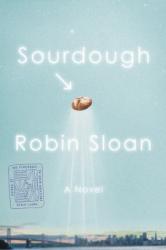
This book is.... very hard to categorize. I read it because I LOVED Mr. Penumbra's 24-Hour Bookstore, which was also kind of quirky. Lois, an engineer at a robotics company, is given a special sourdough starter by the odd owners of a small restaurant which closes unexpectedly and without much explanation. The starter has some unique properties, and Lois ends up becoming quite obsessed with its care and development, joining a very unusual and exclusive farmer's market to sell the bread she makes. An interesting tale of the melding of traditional skills and technology.
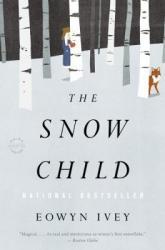
Set in the 1920’s, this is the story of Jack and Mabel, a childless couple homesteading on the Alaskan frontier. The workload is never-ending, and without children to help with plowing, planting and harvest, they struggle not only to survive, but to avoid losing themselves to despair and disappointment. It is a story not only of survival and grit, but also of the kindness found in a community of like-minded individuals and families. This theme is typical of much historical fiction about western expansion and pioneer life, but this story holds an unexpected and delightful twist, where magic, reality and fairytales intersect. The first snow of the year is met with a playfulness that is not typical of Mabel and Jack. They end their snowball fight by building a snow-child near their cabin, complete with mittens, a hat, and arms made from twigs. The next day, they discover that their snow child was destroyed during the night – likely by wild animals. Their journey from that point is full of hope and expectation. The story has a dream-like, ethereal quality, yet the author maintains the sense of solidity that is required for historical fiction to work. The pace is slow, but fits well with the time and place. I sincerely enjoyed this author’s first novel. It made me think about the importance of accepting others as they are – always an important consideration. I have Eowyn Ivey’s second book in my “to read” stack right now, and will eagerly read her future offerings.
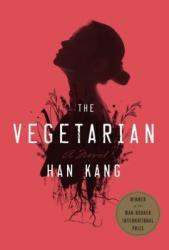
In this inventive South Korean novel (based on an earlier short story by the author), a woman decides to become a vegetarian after a disturbing, blood-soaked dream leaves her convinced that she needs to purify herself. Yeong-hye remains largely a mystery to us throughout the novel -- we hear about the situation mainly from her husband, brother-in-law, and sister, and they're often more interested in what they want from her (passivity, "normal" behavior, sexual gratification) than in understanding what's happening inside her mind. It's interesting to watch the escalation of behavior that's considered inappropriate; even the most mild changes to her routine provoke violent reactions and eventually lead her family members to cross lines of their own. At first, not eating meat alone is shocking and indicative of disrespect for her husband, then a refusal to wear a bra, then a discomfort with speaking -- and the gap widens more and more between Yeong-hye and the people around her as she withdraws from the world in her obsession with becoming more plant than animal.
Still, despite the oddity of the premise, it reads more like horror than comedy, and there was some real emotional weight to Yeong-hye's problems and to the exploration of the internal lives of her family as they react to her rebellion in increasingly bizarre ways. I liked the first section (dealing with the destruction of Yeong-hye's marriage) more than others, but they were all fascinating, and the sister's perspective helped bring things to a satisfying conclusion. Some parts were a bit too on the nose for my taste, but it was an engrossing read overall. There was a lot of reflection on the position and treatment of women in modern-day South Korea, which may interest some readers, as well as a more general look at the everyday violence around us, people's inner desires, and the pressure to conform. (I'd give this 3.5 stars if I could, but I rounded up because the writing deserved it.)
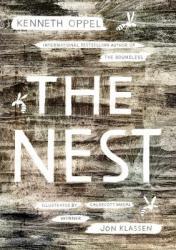
Steve's baby brother is sick. Like, probably going to die soon sick. So, when Steve is visited in his dreams by the wasps living in the nest over his house, and they offer to fix the baby, Steve feels like all of his problems are being solved...until he realizes the solution is perhaps not as perfect as it originally seemed.
This is one weird, creepy little novel. I listened to it (and apparently it's illustrated, so I missed the illustrations), and narrator was a little blah at first, but later on in the story I realized that that was probably somewhat intentional. The first disk was a little slow for me, but by the final disk, I was sitting in my driveway listening because I just had to know what was going to happen. Wow. I've never read anything quite like this, and while I won't say that I loved it, I did ultimately enjoy it.
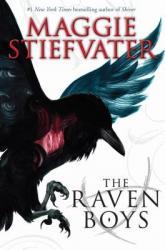
Blue Sargent is not a psychic. Her mom is a psychic. Her aunts are all psychics. But Blue has another skill - she can amplify psychic power. So every year on St. Mark's Eve, she accompanies one of the "real" psychics to
greet the ghosts of the people who will die in the next year. Usually, she sees nothing. But this year, she sees the ghost of a boy: Gansey. Later, Blue and Gansey have a meet-not-cute, and Blue finds herself swept along with Gansey and his friends Noah, Adam and Ronan on an epic quest to find a long lost Welsh king...because Blue thinks that this king might be the only thing that can save Gansey.
First, I love the way Stiefvater writes. She manages to imbue whimsy and/or something otherworldly (and often slightly sinister) into almost every paragraph, and her descriptions are often at once hilarious and spot on. For example:
April was a bad time for the Aglionby boys; as it warmed up, the convertibles appeared bearing boys in shorts so tacky that only the rich would dare to wear them.
or
Ronan kept staring at Whelk. He was good at staring. There was something about his stare that took something from the other person.
Great, unique descriptions. I just love her writing and her ability to make the reader feel like they've known the characters forever.
On top of that, the plot is simply and uniquely marvelous. I had never heard of Glendower (our long lost Welsh king), and this story felt really fresh, even though I was reading it for the third time. A colleague thought it was boring, and I will concede that it gets off to a bit of a slow start to allow
for world-building and character development, but I DARE you to try to read the last 100 pages or so in more than one sitting.
It's just soooooooooooooooo goooooooooooooooooooooooooood.
5 unreserved stars. J'dore.
This was such a great novel. So sweet and life affirming. I loved Ivan and Ruby and wanted them to be happy. I thought the novel might have gone a darker route, but I'm glad it didn't. A sweet, quick read.